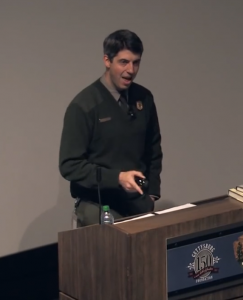GNMP Ranger Christopher Gwinn on What Gettysburg Meant to Its Veterans
 Greetings all - I have really been enjoying the Gettysburg National Military Park's Winter Lecture Series - all available to view free on charge on the GNMP Youtube channel. Yesterday I had a look at park ranger Christopher Gwinn's discussion concerning what the Gettysburg battlefield meant to the veterans who had fought their. I believe that Gwinn did a wonderful job confronting what I long ago dubbed the "reconciliation premise," or rather, scholars' (read David Blight and others) persistent and influential notion that reconciliationists locked arms with white supremacists and crafted a white-washed Civil War memory on southern terms. The premise, as Gwinn notes, can certainly ring true - but only if viewed through a conspicuously narrow lens. For example, the 1913 and 1938 Blue-Gray reunions on the battlefield were unquestionably devoid of any divisive issues - especially those concerning slavery and emancipation. After all, these were national events honoring both sides and they were specifically meant to foster reconciliation. Rekindling prickly issues over the causes and consequences of the war was not on the agenda.
But Gwinn, quite correctly, points out that the articulation of Civil War veterans' memories at Gettysburg (especially Union veterans) was somewhat more complicated than the "forgive and forget" scenarios in '13 and '38. When not in the company of former enemies, which was the more typical variety of commemorative event, Federal veterans were quite clear on why they had fought, the righteousness of their victory, and the bitterness that continued to inform their memories late in life. They used the Gettysburg battlefield to express their views - however impassioned and however belligerent.
Greetings all - I have really been enjoying the Gettysburg National Military Park's Winter Lecture Series - all available to view free on charge on the GNMP Youtube channel. Yesterday I had a look at park ranger Christopher Gwinn's discussion concerning what the Gettysburg battlefield meant to the veterans who had fought their. I believe that Gwinn did a wonderful job confronting what I long ago dubbed the "reconciliation premise," or rather, scholars' (read David Blight and others) persistent and influential notion that reconciliationists locked arms with white supremacists and crafted a white-washed Civil War memory on southern terms. The premise, as Gwinn notes, can certainly ring true - but only if viewed through a conspicuously narrow lens. For example, the 1913 and 1938 Blue-Gray reunions on the battlefield were unquestionably devoid of any divisive issues - especially those concerning slavery and emancipation. After all, these were national events honoring both sides and they were specifically meant to foster reconciliation. Rekindling prickly issues over the causes and consequences of the war was not on the agenda.
But Gwinn, quite correctly, points out that the articulation of Civil War veterans' memories at Gettysburg (especially Union veterans) was somewhat more complicated than the "forgive and forget" scenarios in '13 and '38. When not in the company of former enemies, which was the more typical variety of commemorative event, Federal veterans were quite clear on why they had fought, the righteousness of their victory, and the bitterness that continued to inform their memories late in life. They used the Gettysburg battlefield to express their views - however impassioned and however belligerent.
As such, Gettysburg battlefield ceremonies denote not only valor on the field of the so-called "turning point of the war" - as we learn from the inscriptions on the many monuments that cover the landscape, but also - if one reads the speeches delivered at monument dedications - a site of memory where veterans could rehash the more divisive issues.
Gwinn focuses almost entirely on Union veterans, which makes sense considering that Confederates are not well represented on the field. Yet he might have noted with more emphasis that former Rebels expressed their own versions of war memory elsewhere and in equally vehement fashion. Their war memories included issues such as tyranny and the perversion of the intentions of the founding generation - they did much the same thing as their Union counterparts on fields at Fredericksburg, Chancellorsville, and in town squares across the South. In fact, typical Gettysburg commemorative events reflected the kind of commemoration that took place on both sides of the Potomac - on battlefields, courthouse lawns, and veteran meeting halls. Recognition of this broader sense of veteran commemoration would have served to strengthen his argument about Gettysburg. But this aside, Gwinn convincingly suggests, and I enthusiastically agree: veterans were willing to reconcile, but only on terms of their own writing. You might guess how all of this worked out.
Please watch the video below and add your two cents in the comments section. I am happy to keep the conversation going. And thanks to Mr. Gwinn for recommending my book, Across the Bloody Chasm. He couples it with Caroline E. Janney's magnificent Remembering the Civil War, which looks at similar issues but casts a wider net - and arrives at a few different conclusions. More on that later - I have a review of Carrie's book in the works.
With compliments,
Keith